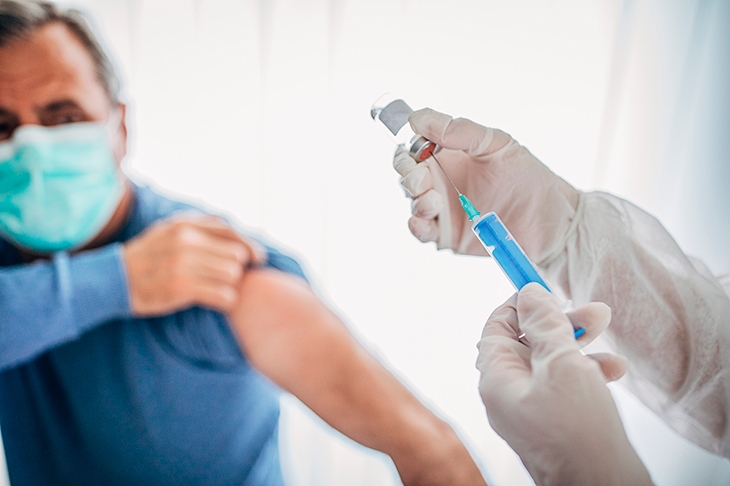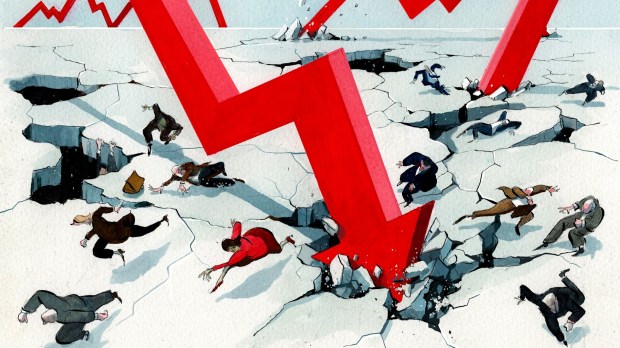Is that a light at the end of the tunnel — or a second lockdown thundering unstoppably towards us? News of a viable vaccine is the one development in the Covid drama that could drag the national mood out of the current despair that’s pulverising economic recovery; it would also provoke a euphoric stock market rally. And it’s clearly getting closer. But how close?
The chance of a magic potion for Christmas remains ‘slim’, according to Vaccine Taskforce chair Kate Bingham; spring next year is a safer bet, says chief scientific adviser Sir Patrick Vallance, adding that ‘we should not overpromise’. He’s right there: the worst thing ministers could do — worse than any Covid cock-up so far — would be to create expectations of swift vaccination for the old, the vulnerable, and frontline workers, then fail to deliver.
So a crescendo of ‘vaccine breakthrough’ stories will be met, for the time being, by Downing Street discouragement — no doubt denying, for example, that Matt Hancock recently gave some Tory backbenchers the impression that eight million jabs could take place in December. That’s not impossible if the drug giant Pfizer is really gearing up to distribute 100 million doses to major customers, including the NHS. But how far will we be knocked back if Donald Trump has ordered US officials to buy all available doses — ‘leaving none for Britain’, according to one breathless report — of the rival AstraZeneca-Oxford version?
If news management will be tricky, the logistics of the vaccination programme itself will be incomparably more demanding, with media attention swiftly turning to the question of who’s fit to take charge of it. As a career life-sciences investor, Kate Bingham knows about drug development but not, we might guess, about mass distribution. And like Baroness Harding of Test and Trace, whose husband is a Tory MP, Bingham will be open to jibes that she happens to be the wife of Treasury minister Jesse Norman.
On the other hand, who in business or public life could seriously be expected to know all that’s required to deliver urgent shots to an entire nation in an orderly queue, an exercise several times larger than the annual NHS flu jab campaign? This will need skills drawn from the likes of Ocado, Ryanair and Royal Mail as well as the armed forces and Whitehall. It will be susceptible to human and digital error at every point. If it’s rolled out too slowly for fear of getting it wrong, the tabloids will go berserk. It will become an overwhelming national obsession. Running it is not a job I’d rush to apply for.
Relaunched
The unlikely news of a revival (under the ownership of a transatlantic investment crew called Cyrus Capital) of Flybe, the regional airline that went bust in March after a long financial struggle, is evidence for the theory that brands can have several lives so long as customers actually like them — as frequent flyers like me certainly did in Flybe’s case. An even bolder example is the rebirth of Swan Hellenic, the genteel cruise line that appeared to have gone down with all hands in January 2017, a victim of adverse exchange rates plus terrorism fears afflicting many of its ports of call.
Swan’s last ship, the floating-country-house Minerva, was laid up at Marseille and reportedly sold to become a sheikh’s yacht. Now an investor group with Russian connections has acquired the brand and commissioned a smaller, chunkier Minerva from a Helsinki yard, with a first cruise to Antarctica promised for next November. Like many former passengers, I’m nostalgic for the old Swan Hellenic formula of Mediterranean ruins and lecturing bishops. I hope the new incarnation lives up to the name.
No help from Xi
Should we resent the fact that, as western economies stagger under a second wave of the virus from Wuhan, China’s GDP grew by 4.9 per cent in the third quarter (having plunged in the first), with a surge in industrial production and a notable recovery of consumer spending? Or should we be glad that at least China is one major economy that will register positive growth for the whole year? Frankly, I wouldn’t pin much hope on trickledown for the rest of us. President Xi’s new strategy — in part provoked by Trump’s sabre-rattling — is to turn his economy inwards, encourage high-end manufacturing, discourage overseas tourism and de-emphasise external trade. In short, just as Trump would buy all the vaccine if he could, so China would keep all the economic benefits of authoritarian virus-suppression. That, I fear, is how the world really works.
Good fortune
What with the fearsome Dame Louise Casey warning of ‘destitution’ ahead, would it be vulgar to congratulate a reader on his investment profits? Or is this the sort of upbeat item we need as a reminder that prosperity is still achievable if we stay calm and have faith in our own long-term judgment? I’ll go with the latter — and tell you that the stock-picker concerned got in touch to say he had bought several of the shares named in this column over the past couple of years either as tips from our veteran investor Robin Andrews or as constituents of the ‘Optimists’ Portfolio’ Robin and I put together from readers’ suggestions in March 2019.
In particular, he bought and held ITM Power, a hydrogen energy pioneer, and Avacta, equally pioneering in cancer and Covid diagnostics, both of which have risen tenfold. He also bought the battery venture Ilika, which has nearly doubled, and traded successfully in and out of the more volatile mining royalties group Anglo-Pacific.
Naturally some of his (and our) other picks didn’t do so well. But the net result — so he told us over a long liquid lunch in one of my Yorkshire locals, the Pheasant at Harome — is that he has ‘made enough to pay for my two granddaughters’ education’. A happy story, a convivial encounter and the best possible use of good fortune.
Got something to add? Join the discussion and comment below.
Get 10 issues for just $10
Subscribe to The Spectator Australia today for the next 10 magazine issues, plus full online access, for just $10.
You might disagree with half of it, but you’ll enjoy reading all of it. Try your first month for free, then just $2 a week for the remainder of your first year.















Comments
Don't miss out
Join the conversation with other Spectator Australia readers. Subscribe to leave a comment.
SUBSCRIBEAlready a subscriber? Log in